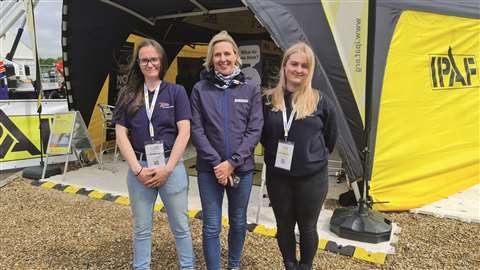How construction can win the war for talent
26 May 2022
A clear message from the industry is the lack of skilled workers - a solution can be found in one half of the population that’s not well represented.
 According to United Kingdom Office for National Statistics figures, women account for only 12% of people employed in the construction industry
According to United Kingdom Office for National Statistics figures, women account for only 12% of people employed in the construction industry
A good example of the skills crisis comes from the US where employment in the construction sector has increased in nearly three-fifths of metro areas, according to new data released by the Associated General Contractors of America (AGC) but contractors still aren’t able to hire as many workers as they want.
The association is urging officials to increase investment in career training and education programmes within the construction sector to help employ more workers.
The analysis, which focuses on the period from February 2020 to February 2022, revealed that there were 364,000 job openings in construction at the end of February, the most since data started to be compiled in 2001.
However, Ken Simonson, the association’s chief economist, revealed that this exceeded the 342,000 workers hired by construction firms, which “implies contractors wanted to hire twice as many employees as they were able to.”
Simonson says, “The rebound in construction employment in most metros shows there is robust demand for infrastructure and non-residential buildings, as well as housing. But contractors say they would hire more workers if there were enough qualified candidates.”
Through the ‘Construction is Essential’ targeted digital advertising campaign and the ‘Culture of Care’ programme that it designed to help firms retain new workers, the association are looking to recruit more people into the industry.
Stephen E Sandherr, AGC chief executive officer adds, “Helping encourage more people to pursue high-paying construction careers will keep America building and contribute to broader economic growth.”
War for construction talent
In his review of the ‘three Ps’ of sustainability – planet, people and profit, Andy Wright, CEO of Sunbelt Rentals UK, says acquiring talent is more than a commercial imperative.
As Wright points out, “whilst it is the reduction of carbon that often grabs the headlines, there is a critical need for our industry to proactively invest in people in the broadest sense - including in the communities that we operate from - if we are to continue to be a relevant employer in the future.”
He adds that those who operate in the construction and equipment rental industry face an impending labour crisis as certain types of workforces age. In addition, we find it difficult to attract younger people.
“We are in a war for talent, and we are competing for that talent against not just other similar companies but also other types of organisation like the technology giants, or Amazon-style modern businesses with strong employee brands. These can seem more appealing to younger generations.”
Under the Environmental, Social, and Governance (ESF) system for measuring the sustainability of a company, the S stands for social.
Wright explains, this focuses on people and that which relates to and are important to people, such as skills and training, personal development, diversity and inclusion, to name but a few, as well as their own personal values that are fundamental to their belief systems.
“It’s this final point that is becoming crucial in winning the war for talent, because to prosper over time and, by definition, become sustainable, every business must not only deliver acceptable financial performance in the way it did in the past, but it must also now be able to show how it makes a positive contribution to society.”
How the pandemic contributed to employee diversity
Adding to this, experts in Sweden say the Covid-19 pandemic has helped those existing efforts to diversify the industry.
Speaking on the subject of women in the construction sector Elin Kebert, competence expert at the Swedish Construction Federation, says the pandemic has been an opportunity for the Swedish construction industry to move forward with women’s issues.
Since the start of the pandemic the number of applicants to higher vocational education programmes backed by the Swedish Construction Federation seeking to fast-track older professionals into site manager positions have increased rapidly.
Kebert adds that in 2021, 32% of the 5,494 students that started a “Higher VET” programme within construction and engineering were women.
An employee’s market
“The post-pandemic boom has definitely created a labour shortage in Swedish construction,” she says. “There are building and construction projects going on throughout Sweden so employers are competing to hire skilled construction workers.
“Employees are able to choose where to work – both men and women are saying, why should I travel long distances to big building sites when I can work close to home, be an active parent and not miss my kid’s dance class. Young professionals want a better work/life balance.”
Based around this philosophy, and bringing the issue to the heart of the access industry, IPAF has launched Women in Powered Access, which is based on a personal goal of the Federation’s new president Karin Nars, and managing director of Finland-based Dinolift.
The initiative recognises and celebrates the contributions of women in powered access, and outlines career paths for women who are already in the industry or looking to enter it.
It will see IPAF provide a platform for case studies of women in the sector to be shared, through its print, web and online resources.
As Nars explains, she was inspired to introduce the initiative after she became the first woman to have been elected to IPAF president in March this year. “We invite women of all ages and different professional roles to share their stories of inclusivity.
Women in the access equipment industry
“Through these stories and role models, we want to communicate the broad opportunities our industry can offer women. And we do not want to compare or exclude anyone.”
Karin Nars says, “Inclusion is important because it enables people to share different perspectives in a supportive environment.
Safety is a joint effort to which everybody can and should contribute to. Therefore, we cannot afford to exclude anybody from the conversation surrounding safety in our industry and the actions we recommend. While we may work in a male-dominated business, there is more to the story than that.
Nars adds, “An important first step is to encourage more women to bring their knowledge, passion and work ethic to our industry. The difference they can make can be a positive surprise in many ways. We already have thousands of women in our industry whose stories have not been told. And their stories are something young women need to see and hear – to help them become inspired and learn about paths women have taken in our industry. ”
“We are inviting everybody with a passion for our industry, and a passion for safety in powered access, to be heard and to contribute. It is all about cooperation and bringing different perspectives to the table – for the good of our industry.”
Two female apprentice engineers Catherine McCreedy and Megan Campbell were on IPAF’s stand during May’s Vertikal Days show to share their stories. “We hope they will be the first of many, and that their stories and those of others will inspire women to enter our industry,” says Peter Douglas, MD, IPAF.
Case Studies
 From left: Catherine McCreedy, Karin Nars and Megan Campbell. (Photo: IPAF)
From left: Catherine McCreedy, Karin Nars and Megan Campbell. (Photo: IPAF)
IPAF’s Women in Powered Access initiative includes case studies of women in the sector that it is sharing in a bid to encourage more women to enter the industry. The first two to take part are Catherine McCreedy, second year apprentice engineer at Speedy Powered Access, and Megan Campbell, first year apprentice engineer at Summit Platforms, both in the UK. Here follows their case studies:
How I came into this industry and what attracted me
McCreedy: What attracted me to this industry initially was that it sounded like a challenge – and I like a challenge.
Campbell: Since leaving school I knew I wanted to be in a practical role in engineering. I started a mechatronics apprenticeship as a school-leaver, but found I enjoyed the mechanical side more and wanted to pursue it further. I then found an apprenticeship in powered access with Summit Platforms, through which I attend NWSL college. What initially attracted me to the industry was the opportunities and progression that can be achieved, as well as the importance of the role in the workshop to keep the customer’s machine safe to use.
What drives and inspires me about my role?
McCreedy: There is so much opportunity out there and I feel that I can amount to anything – the opportunities within the powered access industry really are endless.
Campbell: Every day I come to work I am one step closer to qualifying as a service engineer with Summit Platforms. The harder I work the more opportunities I can create within the industry.
What do I want to achieve and where do I see myself in five years?
McCreedy: I would like to achieve the best possible result in my apprenticeship, just like anybody else would. In five years my goal is to be a competent, qualified engineer, working in a job I enjoy.
Campbell: I would like to have finished my apprenticeship and gained valuable on-site experience and hopefully see more like-minded women in this industry. You never know …over the next five years I could become the first female senior engineer in the industry in the UK. I aspire to continue to be an ambassador for women wanting to work in the powered access industry.






